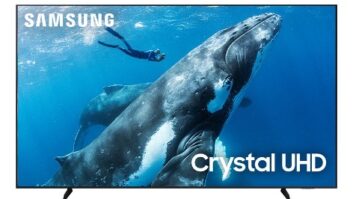Richmond, Va. — Circuit City has taken itself off the auction block and will dramatically reduce new store openings following a $239 million net loss in its second fiscal quarter.
The company may also close existing stores following a comprehensive review of its business, intimated vice chairman James Marcum, who last week succeeded Phil Schoonover as acting CEO. Shorter term, the chain is preparing for the coming holiday season with “simple, easily implemented” fixes, he told investors during a Monday morning conference call.
Domestic sales fell 10.6 percent to $2.2 billion during the quarter, ended Aug. 31, while same-store sales fell 14.4 percent and the net loss mushroomed from the $62.8 million loss reported during the year-ago period.
During the conference call, chief financial officer Bruce Besanko blamed the sales decline on the weak economy, a double-digit drop-off in traffic, new store openings by competitors and the diminished relevance of the Circuit City brand.
“Clearly, the performance of the company is unacceptable to all of our stakeholders, and it is imperative that we take the right steps to accelerate our turnaround,” Marcum said in a statement.
Given current market conditions the company has abandoned plans to pursue a merger or sale, and instead is conducting “a comprehensive review of all aspects of our business,” he said, while working to beef up four core areas: customer experience, execution, service culture and stores.
“We recognize that this will require that we intensify our efforts to correct problems in our business,” Marcum noted, beginning with enhancing the in-store experience to help drive traffic. Plans, many of which were initiated under ousted CEO Schoonover, call for improving in-stocks on key items, creating compelling signage and appealing visual merchandising, and improving training, support and incentives for sales associates.
In addition, Jeff Stone, the former Tweeter CEO who runs the company’s new format The City stores, has been put in charge of all retail operations in order integrate successful elements from the prototypes across the entire chain.
More immediate “simple” fixes for the approaching holiday selling season include:
· finalizing the chain-wide rollout of the “Simple to Shop” selling concept for home entertainment, which reduces frequently asked questions and product demonstrations to five easy-to-follow steps;
· ensuring quicker, “warmer” greetings and faster checkouts; and
· launching a new marketing brand campaign.
During the conference call, chief merchandising officer John Kelly also intimated that Circuit City was prepared to compete on price during the holidays, and would present “compelling offers to enhance traffic.”
In a statement, Marcum said, “Heading into our most important selling season, we are focused on consistent and successful execution in key areas that will drive traffic and build customer confidence. In my observations of the business since joining Circuit City, there are some fundamental principles of retail that we need to execute more effectively. Our full management team has reviewed plans from the past to identify what worked well and what did not. Through this work, we have established simple initiatives that will allow us to ‘get back to basics’ and will guide our actions for the holiday season.”
On the call, Marcum said the company had previously attempted “too many disparate initiatives,” some of which ultimately hurt business. He also cited such external challenges as increased online competition, the emergence of the mass merchant channel in CE retail and declining CE prices.
Marcum hinted at the possibility of store closures by noting in a statement, “We are assessing the productivity of our asset base. We are committed to making the difficult decisions that may be necessary to accelerate our turnaround, improve both our operational and financial performance and deliver shareholder value.”
Asked during the conference call if store closures were in the offing, CFO Besanko replied that all options are on the table.
Circuit has also dramatically reduced its plans to open new stores during the current fiscal year, and will open no new stores in fiscal 2010 to help conserve cash. Cash reserves are down 78 percent to $92.5 million, from $424.4 million a year ago.
Despite analysts’ liquidity concerns, Marcum said he recently held briefings with Circuit City’s top 25 vendors, who assured him that they are pleased with the company’s progress and continue to support the business.
COO John Harlow added that the chain maintains weekly and even daily dialogues with its larger vendors, who will continue “to provide the support we need as we go through the holiday selling season.
“Everyone wants to see a successful Circuit City,” Harlow said.
Besanko said the chain was already showing signs of improvement, including the first gross profit margin gains in 10 quarters and higher attachment rates for labor and extended-service plans in select categories.
Broken out by product sector, Circuit City generated a high-single-digit comp-store sales decrease for video in the second quarter. While comp-store sales of flat-panel TVs increased by a low-single-digit percentage, total TV comps decreased by a high-single-digit percentage, reflecting significant declines in projection and tube TV that more than offset the flat-panel increase.
Comp sales of digital imaging products and accessories, camcorders and DVD hardware decreased by double digits, the company said, while comp sales of digital TV converter boxes, which were not available for sale last year, offset about 300 basis points of the video category’s comp decline.
In IT, Circuit City generated a double-digit comp-sales decrease in the second quarter. Comp-store sales of notebook computers and desktop computers declined by double digits. Unit declines in computers resulted in part from a sales mix shift toward higher-end products that contributed to an improved gross margin rate in the category.
In audio, Circuit City generated a double-digit comp-sales decline in the second quarter. Comp sales of mobile, portable digital audio and home audio products declined by double digits. Comp sales of navigation products decreased by a high-single-digit percentage, the company said.
In entertainment, Circuit City generated a double-digit comp-sales decline, comprised of a low-single-digit comp decline in video gaming products and a double-digit comp decline in sales of video and music software.
Warranty sales were $61.7 million, or 2.7 percent of net sales, compared with $67.0 million, or 2.7 percent of domestic segment net sales, in the same period last year. Firedog PC services and home theater installation revenues decreased 5 percent to $60.2 million, from $63.6 million in the same period last year, as growth in the home theater installation business was more than offset by a decline in the PC services business.
Marcum ended the conference call with an appeal to the company’s sales associates, whose return to a “selling culture” is central to Circuit City’s turnaround. “These are our stores and these are our customers,” he said. “Let’s make it happen.”
Clickhereto read TWICE’s complete coverage of Circuit City and Tweeter.













